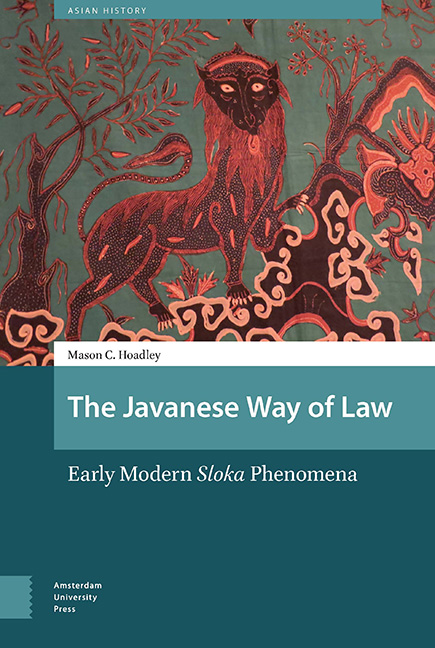Appendix IV - Diverse Components
Published online by Cambridge University Press: 20 November 2020
Summary
Tatayi-dustha-corah
As carry-overs from the preceding era, the concepts of tatayi-dustha-corah – comprising a set of particularly abhorrent transgressions – continued into the Independent Kingdoms era, albeit with modifications. That they were operational before the infusion of Indian concepts is suggested by the fact that one result of ‘Sanskritization’ was to formalize pre-existing concepts under borrowed rubrics. In this form they continued to play an active role in Javanese legal administration through the eighteenth century. The first listing of such transgressions comes from the Kaladi inscription of King Balitung (r. 900-928). It enumerates undesirables who are forbidden to enter the freeholds established by the grant. The relevant part of the inscription reads:
7b 6. The advantages and disadvantages were as follows: Sharing and
dividing, all sorts of fines (dhendha), reviling, the corpse covered in dew
(wangkey kabunan), blood flowing, spattering of saliva
8a 1. moliha maling amuk, maqyana lawang, mati amamumpang, these
were the ‘Eight Kinds of Misconduct’, (my italics)
Despite challenges of deciphering the contents, several of the transgressions are recognizable. Among them are wangkey kabunan (finding a bedewed corpse), maling (thief), amok (weaponed attack), and (a)mumpang (molest/ abduct women). As Javanese terms they very likely pre-date the Hindu era. According to the inscription these with the others mentioned constituted a category known as the astha corah of the ‘Eight Kinds of Misconduct’. The Canggu inscription of 1358, better known as ‘the Ferry Charter’, also refers to these transgressions. In it the good character of the ferry men was established by their freedom from contamination of transgressions of the type listed in Balitung's Kaladi inscription. However, instead of listing individual ‘crimes’, the Canggu inscription mentions freedom specifically from 1) the ‘Eight Larcenies’, the Kaladi inscription's ‘Eight Kinds of Misconduct’, astha corah, 2) strisanggrahana = mumpang (molester/abductor of women), and 3) tanggapi (receiving stolen goods), which belongs to the category of (astha) dustha, i.e., the ‘Eight Miscreants’.
But what were the astha corah and astha dustha to which should be added that of the sad-atatayi or Six Tyrants? They constituted transgressions which entailed the severest punishments ordered directly by the sovereign and normally did not require judicial process.
- Type
- Chapter
- Information
- Javanese Way of LawEarly Modern Sloka Phenomena, pp. 251 - 262Publisher: Amsterdam University PressPrint publication year: 2019

